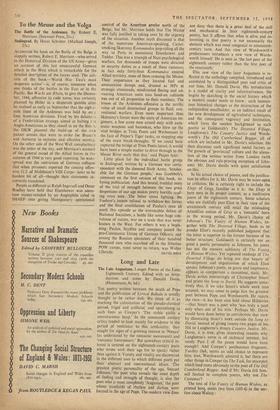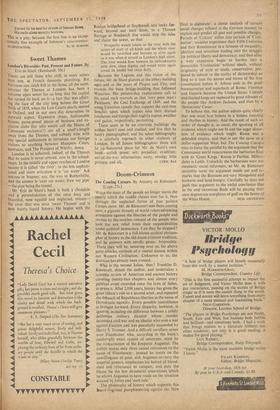Long and Late
The Late Augustans, Longer Poems of the Later Eighteenth Century. Edited with an intro- duction and notes by Donald Davie. (Heinemann, 8s. 6d.)
THE poetry written between the death of Pope and the publication of Lyrical Ballads is usually thought to be rather dull. We think of it as marking the culmination of the pseudo-classical period, frigid and artificial, and specialising in such lines as Cowper's 'The stable yields a stercoraceous heap.' In the nineteenth century critics tended to look mainly for evidence in the period of resistance to this artificiality; they sought for signs of a growing interest in 'Nature' (as understood by the romantic movement) and `romantic forerunners.' But nowadays critical in- terest is centred on the eighteenth-century poets who wrote with their age (so to speak) rather than against it. Variety and vitality are discovered in the different uses to which different poets put their abstract and conventional idiom. The greatest poetic personality of the age, Samuel Johnson,' the poet who reveals the most depth of feeling and strength of thought, is also the poet who is most completely 'Augustan,' the poet whose standards of rhythm and diction were formed in the age of Pope. The modern view does
not deny that there is a great deal of the dull and mechanical in later eighteenth-century poetry, but it afOrms that what is alive and in- teresting in that poetry is not necessarily the element which was most congenial to nineteenth- century taste. And this view of Wordsworth's predecessors introduces a new view of Words- worth himself. He is seen as 'the last poet of the eighteenth century rather than the first poet of the nineteenth.'
This new view of the later Augustans is re- flected in the anthology compiled, introduced and annotated by a distinguished poet and critic of our time, Mr. Donald Davie. His introduction is a model of clarity and informativeness. He begins by sketching in the social history which a modern reader needs to know : such momen- tous historical changes as the destruction of the independent smallholder, as an indirect result of the new development of agricultural techniques, and the consequent vagrancy and destitution, which form the sombre background to such poems as Goldsmith's The Deserted Village, Langhorne's The Country Justice and Words- worth's The Old Cumberland Beggar, all of which are included in Mr. Davie's selection. He then discusses such significant social factors as the growth of 'provincial' culture and the aliena- tion of the serious writer from London (with the obvious and rule-proving exception of John- son). Mr. Davie dwells with quiet satisfaction on this.
In his actual choice of poems, and the justifica- tion he offers for it, Mr. Davie may be more open to criticism. He is certainly right to include the Elegy of Gray, familiar as it is: the Elegy is here seen in its proper context, as a meditative poem of the eighteenth century. Some scholars who are dutifully post-Eliot in their view of the seventeenth century still retail the misleading Arnoldian notion of Gray as a 'romantic' born in the wrong period. Mr. Davie's choice of Johnson's The Vanity of Human Wishes, to- gether with The Deserted Village, leads us to ponder Eliot's recently published judgment that the latter is superior to the former because of its better structure. Goldsmith is certainly not so great a poetic personality as Johnson, his poem has not the massive sublimity of The Vanity of Human Wishes. Yet repeated readings of The Deserted Village do bring out that beauty of development and organisation of which Eliot speaks; Johnson's poem, so grave and impressive, appears in comparison a monotone, static. Mr. Davie writes interestingly of Christopher Smart and prints the Song to David. He suggests tenta- tively that, if we take Smart's whole work into account, we may come to judge him the greatest poet between Pope and Wordsworth. He rejects the view—it has been also held about Holderlin —that Smart was a poet who 'was truly a poet only when out of his witS.' Perhaps Mr. Davie would have done better to corroborate that view by illustrating Smart's work outside the Song to David, instead of giving twenty-two pages of his 104 to Langhorne's dreary Country Justice. Mr. Davie, it is true, gives interesting reasons why Langhorne's verse is of technical interest; but surely Part I of the poem would have been enough? And Cowper's posthumous fragment, Yardley Oak, seems an odd choice to represent him; true, "Wordsworth admired it, but there are other things in Cowper (in The Task, for example) which lead more obviously to the poet of The Old Cumberland Beggar. And if Mr. -Davie felt him- self limited to complete poems, why not The Castaway?
The text of The Vanity of Human Wishes, as printed here, omits two lines (103-4) in the sec- tion about Wolsey :
Turned by his nod the stream of honour flows, His smile alone security bestows.
This is a pity, because the first line is an excep- tionally fine example of Johnson's concreteness-



































 Previous page
Previous page